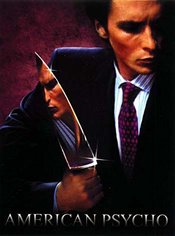(Note: This review discusses the uncut version of the movie. I’ve never seen the theatrical release.)
When I drafted the voiceover post for Tuesday, I hadn’t yet watched American Psycho, so I had no idea how thematically appropriate it would be.
So I suppose the narration is as good a place as any to begin. I was neither thrilled by nor horrified by the use of a first person narrator in American Psycho. Given that it’s based on a novel, I imagine the first person narration is a crucial feature of the source material. For what it is, it’s integrated decently, and gives some nice moments to the film, forcing the viewer into complicity with Bateman.
There’s not much to complain about in general about the technical finesse of American Psycho. The cinematography is solid (and also clearly done with an eye on popular trends in the way 80s films were shot; I had to keep reminding myself the film was made in 2000). Christian Bale delivers a truly impressive performance, conveying a great deal with subtle facial expressions and detailed acting choices. For me, his quiet pseudo-rationality may be the film’s greatest strength. The pacing is good, and the screenplay is solid.
I appreciated this movie intensely. So why didn’t I love it?
I realize this could, at some point, lead to deeper questions. Why does anyone like anything? But I don’t mean to say it’s a simple matter of taste; of course taste factors in, but I think I can pinpoint a few things.
The alienation that this movie creates works almost too well, for one thing. I understand that it avoids allowing you to connect meaningfully with any of the characters and sequences events episodically on purpose; I even feel I’ve as sense as to why it does so. When the subject of your movie is a man with no ability to connect whatsoever, having your form reflect his mindset is a reasonable artistic choice.
But it also makes it hard for me to emotionally invest in the film. And if the emotional connection is gone, the art can’t be just good. It has to be amazing, to leap over the gulf of emotional abstraction. The craft of this film is ahead of the curve, but it’s not that far ahead of the curve.
The film is an above average character study, and the fact that the character’s a psychopath does give the film an extra boost. But until the ending, it’s variations on a theme. It’s the cinematic equivalent of Philip Glass music; minimalist variations on a theme, explored over and over.
I love Glass, in fact, but I understand why some people don’t. And while watching how this movie builds and resolves around its central conceit of the homicidal maniac as a natural outgrowth of Wall Street culture, I can admire the subtlety of its craftsmanship. (I have to wonder how many movies, ever, can include a homicide by chainsaw and still count as “subtle.”) The film’s central metaphor, on first viewing is fairly overt, but the constant re-contextualizing and reexamining of the character, both from within and without, is worth seeing.
That said, the ending left me unsatisfied. I liked the ambiguity, I liked the reveal, but the final monologue seemed a bit forced. Capping the film by saying “None of this meant anything” is a strong choice, and I want the character to believe it in this case, but I don’t know if I want the director to agree.
It’s only fair to confess, I’m prejudiced in favor of plot, as anyone who knows me in real life will attest. So a movie that pushes the boundaries of plotlessness will have an uphill climb with me.
I’ve since heard the movie described as a feminist critique of a certain form of masculinity, and I can see where this comes from. I’d be interested to rewatch it, eventually, and be able to apply a more critical eye (in the sense of film criticism, not the more casual sense of picking it apart negatively).
Grade: B Overall, it left me a bit flat, but I can appreciate how well the film is made, and I can certainly understand why other people think it’s excellent.


